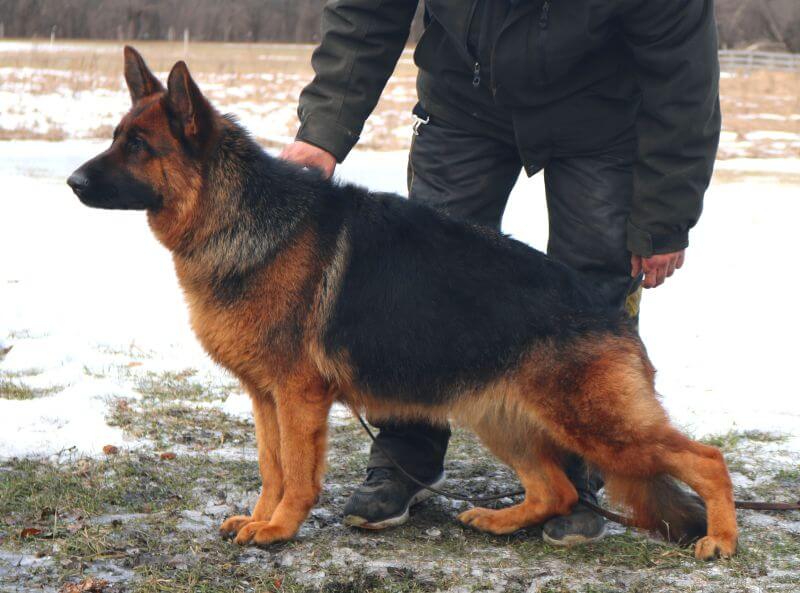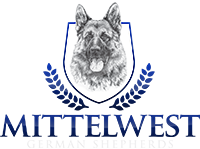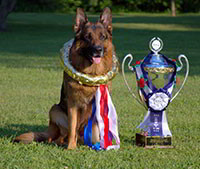German Shepherds are one of the most recognizable and admired dog breeds worldwide. They have earned a reputation as versatile working dogs known for their intelligence, loyalty, and strength. However, many wonder about their suitability for a different yet equally demanding role—service dogs.
For those seeking a reliable companion to assist with daily challenges, the idea of a German Shepherd as a working partner is worth exploring. This article delves into their traits, training needs, and how they overcome challenges to excel in support roles. By understanding what makes them stand out, you can decide if they fit your needs.

What Makes A German Shepherd Suitable For Service Work?
Service dogs are highly trained to perform specific tasks to assist individuals with disabilities. Unlike therapy or emotional support companions, the Americans with Disabilities Act (ADA) legally recognizes them as working dogs. Their specialized training allows them to reliably support their handlers in any environment, whether public or private.
Service dogs help individuals live more independently by performing tasks matching their handler’s needs. They provide safety and support through their specialized training. Some examples of service dog tasks include:
- Helping individuals with mobility issues stand, walk, or balance.
- Guiding individuals with visual impairments.
- Retrieving items like medication, phones, or dropped objects.
- Alerting individuals to seizures, low blood sugar, or panic attacks.
- Providing physical or emotional support in stressful situations.
Service dogs must work effectively in many different environments, making breed selection a key factor in their success. A dog’s temperament, size, trainability, and stamina influence its ability to perform consistently. Choosing the right breed ensures the dog can meet the demands of this critical role.
What Makes These Dogs Stand Out As Working Animals?
German Shepherds have earned a reputation as one of the most reliable working dogs. Known for their intelligence, strength, and adaptability, they thrive in roles that require focus and precision. Whether assisting individuals, protecting communities, or performing specialized tasks, they consistently rise to the challenge.
Physical Attributes
Large-breed German Shepherds are renowned for their strength and sturdy build. Males usually weigh 65–90 pounds, while females at 50–70 pounds provide the strength to support mobility tasks. Their solid frame enables tasks like bracing, balance support, and wheelchair pulling, which smaller breeds can’t handle.
Beyond their strength, German Shepherds possess remarkable endurance. These dogs efficiently work long hours without tiring, which is critical for tasks requiring consistent physical effort. They stay energetic and focused for hours, supporting handlers at home, outdoors, or in public.
What truly makes them stand out is their exceptional agility. Despite their large size, they are surprisingly nimble and can easily maneuver through crowded areas, narrow spaces, and uneven terrain. For those requiring physical support, German Shepherds provide the strength and grace needed for reliable daily assistance.
Temperament
Temperament is another defining characteristic of German Shepherds. Service dogs must remain calm, focused, and reliable under all circumstances, and they meet these standards. Key traits include:
- Intelligence: German Shepherds have an incredible ability to learn and remember complex tasks, which is critical for service work. They learn to follow specific commands, recognize emergencies, and adapt to new situations.
- Loyalty: Once they bond with their handler, they become deeply committed to its role. This loyalty drives them to perform their tasks with consistency and care.
- Confidence: A socialized German Shepherd remains calm and steady, even in busy or noisy environments. This confidence helps them perform their duties in public spaces without becoming nervous or distracted.
German Shepherds’ temperament makes them ideal for demanding service roles. Their intelligence, loyalty, and confidence ensure they can handle tasks reliably while remaining calm and focused. With training and socialization, these traits help them excel as reliable companions, prepared to assist in any situation.
Protective Instincts
German Shepherds possess a natural protective nature, but this trait doesn’t equate to aggression. Proper training and early socialization help them balance their instincts, allowing them to stay calm and composed while remaining attentive to their surroundings. They reliably assess situations and respond appropriately without overreacting.
For individuals with post-traumatic stress disorder (PTSD), anxiety, or emotional challenges, German Shepherds offer steady, reassuring companionship. Their presence creates a sense of security and stability, helping handlers feel more at ease in public or unfamiliar environments.
This support boosts confidence and allows individuals to navigate daily life with greater peace of mind.
Health Considerations
German Shepherds excel as working dogs due to their resilience and physical endurance. Their strength and stamina enable them to handle demanding tasks and consistently support their handlers. These dogs remain healthy and capable with regular exercise, a balanced diet, and routine veterinary care.
When bred responsibly, they are less prone to common joint issues, enabling them to enjoy long, productive careers. They often live 9–13 years with proper care, retaining their energy and reliability well into their senior years. Their durability and ability to perform consistently make them a standout choice for long-term working partnerships.
German Shepherds possess impressive traits that make them exceptional working dogs. Their ability to perform complex tasks and adapt to various environments sets them apart from other breeds. However, like all large breed dogs, they come with challenges that potential handlers should consider.
What Should You Consider When Choosing a Large Breed Dog?
Large breed dogs are remarkable in strength, intelligence, and versatility, but their size and specific needs require thoughtful consideration. Their abilities make them excellent companions, but handlers must assess if they can meet their space, care, and training needs. Here are factors to consider to ensure a successful partnership:
- Space Requirements: Large dogs need room to move and rest comfortably. Homes with limited space, such as small apartments, may not accommodate their size and activity needs.
- Dietary Needs: Their size often demands a higher quantity of food, which can increase feeding costs. Proper nutrition tailored to their health and activity level is vital.
- Exercise Demands: Large breeds need regular exercise, like walks, runs, or playtime, to stay healthy and well-behaved, which can demand significant time from owners.
- Health Monitoring: Large breeds are prone to hip dysplasia and joint issues. Routine vet visits and preventative care are critical to maintaining their well-being.
- Socialization: Early exposure to different environments, people, and animals helps large dogs remain calm and adaptable in various situations.
- Public Accessibility: Navigating tight spaces or crowded areas can be more challenging with a large dog, which requires additional training to ensure appropriate behavior in public settings.
Choosing a large breed dog goes beyond admiring their physical strength or temperament. While their size and care requirements present unique challenges, these are manageable with the proper preparation, space, and commitment. With consistent training and dedication, German Shepherds can excel as reliable, well-behaved companions in any setting.
How Can You Effectively Train A Service Dog?
Training is critical in shaping a German Shepherd into a reliable and confident working partner. They undergo training that builds obedience, confidence, and physical fitness to reach their full potential. These areas play a critical role in preparing them for service roles.
Start Training Early
Training begins during puppyhood, focusing on basic obedience commands like “sit,” “stay,” and “come.” These foundational skills set the stage for advanced abilities later. Consistently reinforcing these basics prepares the dog for the specialized tasks they will perform.
Focus On Socialization
Socialization is just as necessary as obedience training. Trainers expose dogs to various sounds, people, animals, and settings to help them adapt to situations they may face in their role. This reduces the risk of anxiety or fear, allowing the dog to handle public spaces and crowded areas easily.
Teach Task-Specific Commands
Obedience training teaches German Shepherds to respond reliably to commands in high-pressure or distracting situations. Trainers focus on verbal and hand signals to ensure the dog listens and acts without hesitation. Obedience ensures safety and efficiency, enabling the dog to retrieve objects, navigate obstacles, or assist during emergencies.
Provide Regular Exercise
Physical conditioning keeps German Shepherds strong and ready for active roles. Trainers incorporate regular exercise, including daily walks, swimming, and agility drills, to maintain strength and joint health. Staying fit enables the dog to handle tasks requiring endurance, such as mobility support or physical assistance.
Engage In Mental Stimulation
Mental challenges sharpen a German Shepherd’s focus and prepare them for complex tasks. To keep their minds sharp and engaged, they benefit from problem-solving exercises, task-focused games, and puzzle toys. This training helps the dog learn advanced skills, like recognizing emergencies or adapting to a handler’s unique needs.
Proper training unlocks the full potential of a German Shepherd, transforming them into a reliable and capable companion. While these intelligent dogs thrive with the appropriate guidance, achieving such results requires skills and dedication. Partnering with trusted professionals ensures they receive the care and preparation needed for success.
Why Choose Mittelwest German Shepherds For Your Needs?

Finding the right German Shepherd for a working role is a critical decision. These dogs are more than just companions; they are partners that provide life-changing support. At Mittelwest German Shepherds, we are committed to helping you find a dog that fits your unique needs.
From selecting strong, healthy bloodlines to offering support after you bring your dog home, we are here to guide you every step of the way. Whether you need a puppy to train or an adult dog ready to work, we provide reliable, confident, and loyal companions. Let us help you take the first step toward a rewarding partnership with a remarkable dog.
Large-breed German Shepherds are exceptional service dogs due to their intelligence, loyalty, and physical capabilities. They excel at tasks like providing stability, retrieving objects, and offering emotional support, making them ideal companions for individuals with disabilities.
While considerations like size and health exist, these challenges can be managed with proper care and training. Choosing a reputable breeder like Mittelwest German Shepherds ensures your dog is healthy, well-tempered, and ready to serve.












